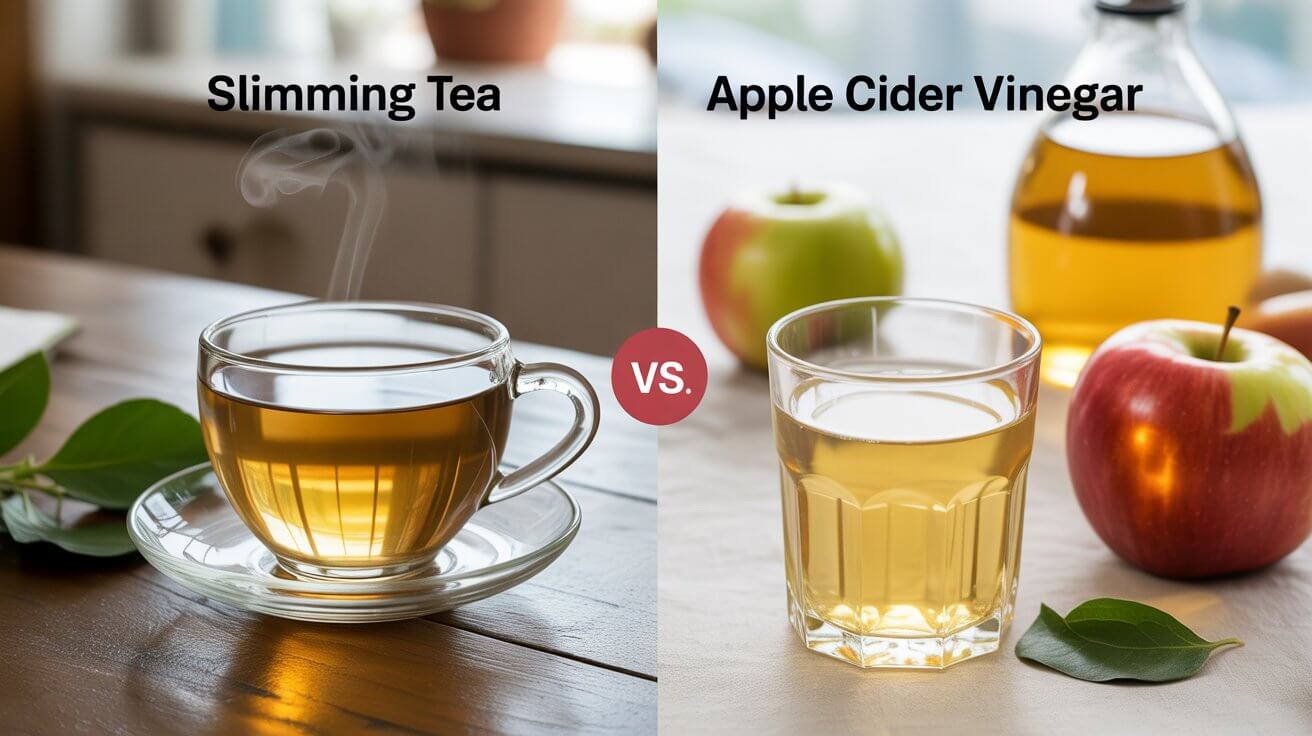When it comes to natural methods for weight management, slimming tea and apple cider vinegar (ACV) are two of the most talked-about options. Both have dedicated followers who claim visible results, but the science behind each is quite different.
In this 2025 updated comparison, we’ll break down how each works, what recent studies say, and which one is safer and more effective for sustainable weight loss with a focus on real, research-backed results rather than viral claims.
Understanding Slimming Tea
Slimming tea refers to a blend of herbal ingredients designed to promote metabolism, digestion, and gentle detoxification. Common ingredients include:
-
Green tea – contains catechins like EGCG, known to enhance fat oxidation.
-
Oolong tea – supports thermogenesis and fat metabolism.
-
Senna leaves – provide a mild laxative effect, aiding digestion.
-
Ginger, peppermint, and dandelion root – help reduce bloating and support gut health.
A 2024 review published in Nutrients Journal found that green and oolong teas may increase daily calorie expenditure by 3–4% when consumed regularly a modest but meaningful boost when paired with a healthy lifestyle.
Slimming tea also provides hydration and antioxidants, unlike most quick-fix diet aids. Many users report that sipping tea replaces late-night snacking and reduces stress-related eating.
Understanding Apple Cider Vinegar (ACV)
Apple cider vinegar is a fermented product made from apple juice, producing acetic acid, which is thought to be the active compound behind its metabolic benefits.
ACV supporters claim it helps:
-
Suppress appetite and promote fullness.
-
Improve insulin sensitivity and reduce blood sugar spikes.
-
Support gut health through natural probiotics.
However, the effects can vary significantly depending on dosage and consistency. According to a 2024 Japanese study published in the International Journal of Obesity, participants who took 15 mL of ACV daily for 12 weeks experienced an average weight reduction of 1.2 kg, mostly attributed to reduced appetite and water loss not direct fat burning.
Because of its acidity, ACV can irritate the throat and damage tooth enamel if not diluted properly, making it less user-friendly than tea.
Slimming Tea vs. Apple Cider Vinegar: How They Compare
| Feature | Slimming Tea | Apple Cider Vinegar (ACV) |
|---|---|---|
| Primary Function | Boosts metabolism & digestion | Reduces appetite & blood sugar |
| Key Compounds | Catechins, polyphenols, caffeine | Acetic acid |
| Ease of Use | Enjoyable daily beverage | Harsh taste, must be diluted |
| Common Benefits | Fat oxidation, hydration, gut health | Reduced cravings, improved glucose control |
| Side Effects (if overused) | Caffeine-related insomnia, dehydration (if laxative-based) | Tooth enamel erosion, throat irritation |
| Long-term Sustainability | Easy to maintain | Difficult due to taste/acidity |
| Research Strength (as of 2025) | Moderate evidence (metabolic benefits) | Limited evidence (appetite control) |
Expert Insights (2025 Update)
According to Dr. Alyssa Kwan, a nutrition scientist at the University of California (2025):
“Slimming tea can complement a healthy lifestyle by slightly improving metabolic efficiency. Apple cider vinegar may support appetite control, but its effects are often overstated. Consistency and balanced nutrition matter far more than either product alone.”
The consensus among dietitians is that tea’s mild, enjoyable nature makes it easier to sustain, while ACV’s acidity limits long-term use.
Health Risks and Precautions
Slimming Tea Risks
-
Overuse of senna-based teas can lead to laxative dependency and dehydration.
-
High-caffeine blends may cause sleep issues or anxiety in sensitive individuals.
-
Some unregulated teas may contain hidden additives always choose trusted brands.
Apple Cider Vinegar Risks
-
Drinking ACV undiluted can erode enamel and irritate the esophagus.
-
Long-term overuse may cause low potassium levels.
-
ACV gummies and supplements vary widely in quality and dosage accuracy.
Note: Both slimming teas and ACV should be viewed as supportive tools, not primary weight-loss solutions.
Which Works Better for Weight Loss?
If you’re comparing results alone, slimming tea generally offers more consistent benefits especially when it includes green tea or oolong as primary ingredients.
Here’s why:
-
Slimming tea works synergistically with hydration, antioxidant intake, and metabolism.
-
ACV results are short-lived unless paired with dietary control and exercise.
-
In terms of sustainability, tea fits naturally into daily routines, while vinegar often feels like a chore.
Many 2025 wellness experts now recommend rotating ACV and slimming tea:
-
Drink ACV (diluted) before lunch for appetite control.
-
Enjoy slimming tea mid-afternoon or evening to support digestion and relaxation.
Safe Ways to Use Slimming Tea and ACV
-
Slimming Tea: 1–2 cups daily, ideally before meals. Avoid bedtime use if caffeinated.
-
ACV: Mix 1–2 tablespoons in a large glass of water before meals, up to twice daily. Never consume undiluted.
Pair either with:
-
A balanced diet rich in fiber and protein,
-
Regular physical activity, and
-
Adequate sleep (7–8 hours per night) for optimal results.
Expert Tip: For individuals with acid reflux or dental sensitivity, tea is the gentler and safer choice.
Conclusion: The 2025 Verdict
When comparing slimming tea vs. apple cider vinegar, both can offer modest benefits but slimming tea stands out as the more enjoyable, sustainable, and scientifically supported option.
It not only supports metabolism and digestion but also encourages hydration and relaxation key factors in lasting weight management. Meanwhile, ACV’s effects on weight loss remain small and often temporary due to taste and acidity.


Leave a Reply